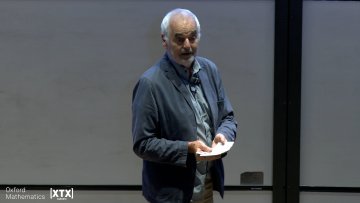A Note on Graphs of $k$-Colourings
Hogan, E
Scott, A
Tamitegama, Y
Tan, J
The Electronic Journal of Combinatorics
volume 31
issue 4
(29 Nov 2024)
Defending Against Diverse Attacks in Federated Learning Through
Consensus-Based Bi-Level Optimization
Trillos, N
Akash, A
Li, S
Riedl, K
Zhu, Y
(03 Dec 2024)
http://arxiv.org/abs/2412.02535v2
Consensus-Based Bi-Level Optimization
Argentine ants regulate traffic flow with stopped individuals
Dobramysl, U
Garnier, S
Poissonnier, L
Dussutour, A
Bruna, M
(09 Dec 2024)
http://arxiv.org/abs/2412.06587v1
We all have to live with uncertainty. We attribute good and bad events as ‘due to chance’, label people as ‘lucky’, and (sometimes) admit our ignorance. In this Oxford Mathematics Public Lecture David shows how to use the theory of probability to take apart all these ideas, and demonstrate how you can put numbers on your ignorance, and then measure how good those numbers are.
Supplementary Data from Mathematical Model-Driven Deep Learning Enables Personalized Adaptive Therapy
Gallagher, K
Strobl, M
Park, D
Spoendlin, F
Gatenby, R
Maini, P
Anderson, A
(11 Dec 2024)
Triple-gluon and quark-gluon vertex from lattice QCD in Landau gauge
Sternbeck, A
Balduf, P
Kizilersü, A
Oliveira, O
Silva, P
Skullerud, J
Williams, A
Proceedings of Science
volume Part F128557
(01 Jan 2016)
Tubings, chord diagrams, and Dyson–Schwinger equations
Balduf, P
Cantwell, A
Ebrahimi-Fard, K
Nabergall, L
Olson-Harris, N
Yeats, K
Journal of the London Mathematical Society
volume 110
issue 5
(01 Nov 2024)
A dynamical analysis of the alignment mechanism between two interacting cells
Leech, V
Dalwadi, M
Manhart, A
Bulletin of Mathematical Biology
volume 87
issue 2
(03 Jan 2025)
Congratulations to Ramón who won the prize for his article Mathematical Memory Machines.
The Graham Hoare Prize is awarded by the Institute of Mathematics & its Applications annually to Early Career Mathematicians for a brilliant Mathematics Today article.


